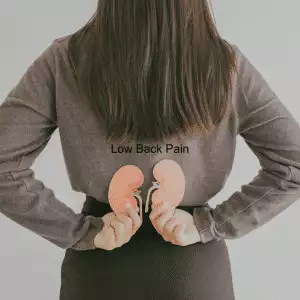By Qineng Tan, L.Ac., Ph.D. and Xiaomei Cai, L.Ac., Ph.D.

Foamy pee, or bubbles in urine? Urinary frequency, or maybe peeing less than usual? Swollen hands and feet? Low back pain? Fatigue? These can be symptoms of chronic kidney disease, or CKD. Acupuncture and TCM can help relieve CKD symptoms and improve kidney health.
Chronic kidney disease (CKD) is a long-term condition characterized by a gradual loss of kidney function over time.
The kidneys play a vital role in filtering waste and excess fluids from the blood, which are then excreted through urine. When the kidneys are damaged, they cannot perform these functions efficiently, leading to a buildup of waste and fluid in the body.
Common symptoms of CKD include foamy urine, foamy pee, bubbles in urine, peeing more or less than usual, fatigue, edema, and swollen hands and feet. Recognizing these symptoms early is crucial for managing and slowing the progression of CKD.
There are different stages and types of CKD, each with varying degrees of kidney damage and associated symptoms. Early stages may present with mild symptoms such as changes in urination patterns, such as foamy urine or peeing more or less than usual.
As CKD progresses, individuals may experience more severe symptoms, including fatigue, swelling in the hands and feet (edema), and even high blood pressure. CKD can be caused by various underlying conditions, including diabetes, hypertension, and glomerulonephritis.
Each type of CKD has its unique characteristics and requires specific management approaches to prevent further kidney damage.
Acupuncture and TCM offer an adjunct or alternative treatment for CKD that can help not only to relieve kidney disease symptoms, but address the root cause of kidney problems.
Types of Chronic Kidney Disease (CKD)

While all types of CKD are related to poor kidney function, different kinds of chronic kidney disease develop due to a variety of factors. Some of the most common causes of kidney disease include:
- Diabetic Kidney Disease, or Diabetic Nephropathy: This type of CKD is caused by damage to the kidneys due to diabetes. About half of all people with Type 2 diabetes also develop CKD. High blood sugar levels can harm the blood vessels in the kidneys, leading to reduced kidney function over time. High blood pressure, swelling of hands and feet, shortness of breath, and loss of appetite are potential symptoms of diabetic nephropathy. The combination of diabetes and CKD can lead to other complications, including retinopathy, gastroparesis, neuropathy, sleep disorders, sexual dysfunction, and cognitive decline.
- Glomerulonephritis: This is a group of diseases that cause inflammation and damage to the tiny capillaries called glomeruli; these are where waste is filtered out of the blood. This can be caused by infections, autoimmune diseases, or other underlying conditions. Symptoms of glomerulonephritis can include blood in urine, nausea, skin rash, joint pain, swollen face or swelling in legs, jaundice, and troubling breathing.
- Polycystic Kidney Disease (PKD): PKD is a genetic disorder that causes fluid-filled cysts to form in the kidneys. These cysts can enlarge the kidneys and reduce their function over time. PKD symptoms can include: pain in side or back pain, sense of fullness in the abdomen, headaches, and kidney stones.
- Interstitial Nephritis, or tubulointerstitial nephritis: This type of CKD involves inflammation and swelling around the tubules in the kidneys. It can be caused by infections, allergic reactions to medications, long-term overuse of pain medications (analgesic nephropathy), or autoimmune disease, such as Kawasaki disease. Symptoms of Interstitial Nephritis can include: fever, blood in pee, nausea and vomiting, drowsiness, and mental confusion.
- Chronic Pyelonephritis: This is a chronic inflammation of the kidney tissue, often due to repeated bacterial kidney infections, or UTIs. This condition most commonly presents in people, who have a structural abnormality that causes urinary obstructions that can lead to vesicoureteral reflux, when urine from the bladder backs up into the ureters and kidneys. Chronic kidney stones, or enlarged prostate can also cause pyelonephritis, as can urinary procedures like cystoscopic exam or catheterization. Painful, burning sensation when urinating, fever, bloody urine, fishy-smelling urine, and pain in the low back or groin pain can all be signs of chronic pyelonephritis.
Recognizing the symptoms and understanding the different types of CKD can help individuals seek treatment earlier and adopt lifestyle changes to help manage the disease effectively.
Acupuncture treatment and other TCM modalities, herbs and nutrition, can be very helpful for managing CKD and its symptoms.
Top 10 Chronic Kidney Disease (CKD) Symptoms
Many people are suffering from chronic kidney disease without being aware of it. The symptoms of CKD can vary widely, and often don’t show up until chronic kidney disease has progressed to more serious stages. Some of the most common symptoms of chronic kidney disease include:
- Foamy Urine or Bloody Urine: Presence of bubbles or foam in the urine, indicating excess protein. Some types of CKD may also cause there to be blood in urine. Fishy-smelling urine can also be a symptom of some types of kidney disease.
- Changes in Urination: Peeing more or less than usual, which can include frequent nighttime urination or reduced urination.
- Fatigue: Persistent tiredness and lack of energy due to the buildup of waste products in the body.
- Edema: Swelling in the hands, feet, ankles, or face caused by fluid retention.
- Shortness of Breath: Difficulty breathing due to fluid buildup in the lungs.
- High Blood Pressure: Hypertension that is difficult to control, which is associated with kidney damage.
- Nausea and Vomiting: Feeling sick to the stomach, which can be a result of toxin buildup in the blood.
- Loss of Appetite: Lack of desire to eat, which can often be accompanied by unwanted weight loss.
- Muscle Cramps: Painful muscle contractions, usually due to electrolyte imbalances.
- Itchy Skin: Persistent itching caused by the accumulation of waste products in the body.
Low back pain, groin pain, and joint pain call all be symptoms of certain kinds of CKD.
People with CKD are more likely to have develop gastroparesis, weak stomach contractions that cause acid reflux, or regurgitation.
These symptoms can vary in severity and may develop gradually as kidney function declines. Early detection and management of CKD are crucial to slow the progression of the disease and maintain kidney health.
Can Acupuncture Help Chronic Kidney Disease?

In TCM, the kidneys are considered the foundation of life, responsible for storing vital essence (known as “jing”) and governing water metabolism, growth, and reproduction. TCM practitioners diagnose CKD by carefully observing and evaluating symptoms, as well as checking a patient’s pulse and tongue to determine the specific imbalance affecting the kidneys.
Acupuncture involves inserting fine needles into specific points on the body to balance the flow of qi (life force energy) and promote healing. Studies have shown acupuncture can improve kidney function, reduce proteinuria (excess protein in urine), and alleviate symptoms like fatigue and edema in CKD patients.
Acupuncture is also beneficial for lowering blood pressure and managing side effects from conventional treatments like dialysis.
Chinese herbs are often used in individually tailored formulas to address the underlying imbalances contributing to CKD. Herbs like Rehmannia glutinosa and Astragalus membranaceus are a few specific herbs that have been found effective in improving kidney function and reducing inflammation. Herbal formulas are combined based on each patient’s specific condition and symptoms.
TCM dietary recommendations focus on foods that support kidney health and balance yin and yang energies. A diet rich in fruits, vegetables, grains, and legumes, while avoiding high-salt, high-sugar, and animal protein-rich foods, is suggested to alleviate symptoms and prevent further kidney damage,
Other TCM treatment for CKD might include moxibustion (burning a herb called mugwort near acupuncture points to stimulate circulation), cupping (creating suction on the skin to promote qi flow), which can help remove excess fluids and toxins from the kidneys, and gua sha (scraping the skin to stimulate circulation). These therapies can help improve kidney function, reduce inflammation, and relieve pain.
By addressing the root causes and symptoms of CKD through a combination of acupuncture, herbal medicine, dietary adjustments, and other therapies, TCM offers a comprehensive approach to managing chronic kidney disease and supporting overall kidney health.
Acupuncture Near Me for Chronic Kidney Disease in Los Angeles
The TCM view of kidney function allows experienced practitioners like Dr. Tan and Dr. Cai at Art of Wellness to help patients with chronic kidney disease to optimize their health while relieving symptoms. If you or someone you love is suffering from kidney disease, it can be helpful to add acupuncture and herbs as an adjunct treatment for CKD in addition to conventional medicine.
*This article is for education from the perspective of Traditional Chinese Medicine only. The education provided by this article is not approved by FDA to diagnose, prevent, treat and cure human diseases. It should not stop you from consulting with your physician for your medical conditions. Traditional Chinese Medicine is based on Qi, which is an invisible force that usually cannot be observed by modern science. Because science focuses on testing ideas about the natural world with evidence obtained through observation, these aspects of acupuncture can’t be studied by science. Therefore acupuncture and Chinese herbs are often not supported by double-blind, randomized trials, and they are considered alternative medicine therapies in the United States.
